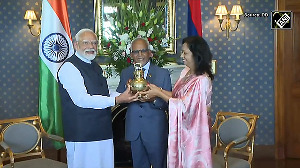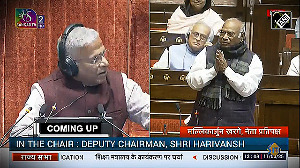Under Secretary of Defence for Policy Michele Flournoy, who co-chaired the Afghanistan-Pakistan interagency policy review along with Special Representative to Afghanistan and Pakistan Richard Holbrooke and Bruce Riedel, acknowledged in Washington on Tuesday that the Pakistani army's focus on India as the major threat despite the obvious internal existential threat from terrorism was a tangible manifestation of the "very deep and historic mistrust between Pakistan and India."
In an interaction that followed a major address on US Strategy in Afghanistan and Pakistan at the Center for Strategic and International Studies -- a leading Washington based think tank where she earlier served as a senior adviser-- Flournoy argued that as a result, "The only way that you are going to give the Pakistani government and armed forces the confidence to shift their focus, is to address some of these areas of tension -- to try to reduce tensions between the countries, to develop confidence building measures, to allow the sort of breathing-space that would allow the Pakistani side to turn their attention to some of the internal challenges they face."
She acknowledged to a question from former US Ambassador to Pakistan Wendy Chamberlain that the Pakistani army was in denial over the internal terrorist threat and still seemed obsessed with the perceived external threat from India.
Thus, she agreed that it was imperative to work with the Pakistani army "to shift their calculus," but argued that in recent times "actually when you talk to a number of people, I think that a step process is happening, especially as the (terrorist) attacks have come further and further into Pakistan, out of the border areas and into the heart of Pakistani society."
Flournoy said, "I think there is a real growing recognition of the internal threat that some of these extremist groups pose to Pakistani society and Pakistan's stability."
"I also think part of the equation is trying to help lower their concerns about other potential threats in the region and hence the regional approach (and integral pillar in President Obama's AfPak strategy) -- that we've got to lower tensions in other areas so that there is greater confidence," among Pakistan's Army and to get it off its denial mode and obsession with India, and to get its "attention to the threat from within," she added.
Flournoy said, "This is a work in progress," and noted that "there are many cases of very close cooperation in combating these (terrorist) groups together and there are areas where we need further improvement."
She emphasised the need for "getting to a very strategic level of partnership," with Pakistan, "and a more consistent and significant level of assistance -- not just money, but in terms of training and advising and working in and across the border."
When she was asked about the Inter-Services Intelligence's involvement in Afghanistan, and its collusion with the Taliban and the Al Qaeda, and also considering that the Central Investigative Agency itself has acknowledged that some ISI elements were involved in the terrorist bombing of the Indian embassy in Kabul nearly two years ago, Flournoy ducked the question.
Earlier, in her speech too, she spoke of the dire need to work to ease tensions between Pakistan and its neighbours, and she was clearly referring to India, although she did not mentioned by name, however, she did so in the question and answer session that followed.
In her remarks, Flournoy said, "Just as events in Afghanistan and Pakistan are connected, both countries are products of heir broader regional engagement, and events in either country can profoundly affect the security and stability of the entire region."
She bemoaned that "in the past, our strategy has not fully taken these regional dimensions into account," but stressed that "going forward, we need to change that -- we need to make regional central and not peripheral to our efforts in Afghanistan and Pakistan, and that will require constant regional diplomacy."
Flournoy said, this was "one of the reasons why the President and the Secretary of State appointed Richard Holbrooke as Special Representative for the region," and predicted that "you will see him constantly shuttling, not only between Afghanistan and Pakistan, but to every regional stakeholder and beyond, in trying to affect the positions on the ground to create the basis for success."
She said, if "we fail to achieve our goals," in Afghanistan and Pakistan, and "if Al Qaeda and its associated violent extremist organisations regroup and gain additional power, it's not just Afghans and Pakistanis who will suffer. We will all be at risk -- 9/11, the bombings in London, Madrid, Islamabad, Mumbai."
"We've all learned painfully in our globalised world that we simply cannot choose to ignore the growth and professionalisation of violence of extremist groups," she said.
Flournoy warned, "And, in a nuclear Pakistan," these stakes were "as high as they can get."






 © 2025
© 2025